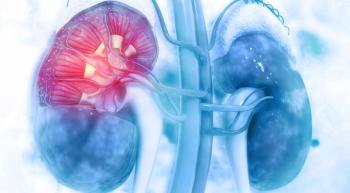
- September 2025
- Volume 19
- Issue 3
Anti-Inflammatory Diet/Exercise Promotes OS in Advanced Colon Cancer
Patients with stage III resected colon cancer had lower risk of death with less inflammatory diets and more regular physical activity.
Less inflammatory diets were significantly linked to an overall survival (OS) benefit but did not significantly increase disease-free survival (DFS) for patients with surgically resected stage III colon cancer, according to findings from a secondary analysis of the phase 3 CALGB/SWOG 80702 trial (NCT01150045) presented at the 2025 American Society for Clinical Oncology Annual Meeting.1
Investigators assessed the diets of 1625 patients using the empirical dietary inflammatory pattern (EDIP) scoring guide following the completion of 2 dietary questionnaires at different points of the study to place patients into quintiles by inflammatory levels of their diets. Patients in the highest quintile (indicating a more inflammatory diet) had an 87% higher risk of death compared with the lowest quintile (multivariable hazard ratio [HR], 1.87; 95% CI, 1.26-2.77; P = .01). Those in the highest quintile had a median OS of 7.70 years, while median OS was not reached in the lowest quintile.
“Our study showed that greater intake of a pro-inflammatory diet pattern is associated with worse overall survival in patients with stage III colon cancer,” detailed Sara K. Char, MD, of Massachusetts General Hospital, Boston, Massachusetts, in her presentation at the meeting.
While an unadjusted model showed a greater trend toward DFS for the lowest quintile, which had a median DFS of 7.21 years, vs those in the highest quintile, which had a median DFS of 6.81 years (HR, 1.46; 95% CI, 1.08-1.97; P = .06), a multivariable-adjusted model demonstrated that this difference was not statistically significant (HR, 1.36; 95% CI, 0.99-1.86; P = .22).
Regarding patient subgroups, the use of anti-inflammatory medications like aspirin and celecoxib yielded no significant difference in OS (P = .54).
Physical Activity and Overall Survival
To provide an additional metric on the effect of systemic inflammation on survival, researchers divided patients into groups of those with higher physical activity levels with a cutoff of 9 MET-hours per week. As Char explained, 9 MET-hours equates to approximately 30 minutes of “vigorous walking” 5 days a week along with light yoga.
“We wanted to examine the joint effect of physical activity and diet on overall survival, as we know that both can impact systemic inflammation,” explained Char in her presentation.
Those with lower levels of physical activity and diets in the highest through second lowest quintiles of inflammatory diets had a 63% higher risk of death compared with those in the same EDIP categories but with higher physical activity levels (95% CI, 0.25-0.53; P < .0001).
In Char’s presentation, she mentioned that data also presented at the conference further validates the efficacy of exercise in prolonging survival for patients with stage III colon cancer.
Findings from the phase 3 CHALLENGE trial (NCT00819208) demonstrated that enrolling patients in a
ASCO chief medical officer and executive vice president Julie R. Gralow, MD, FACP, FASCO, echoed the emphasis on the relationship between the 2 abstracts.
“Putting these 2 abstracts into perspective, we as physicians need to be essentially prescribing healthy diet and exercise,” Gralow remarked. “The combination of the 2 [is] synergistic.”
Patient Characteristics and Inflammatory Diet Associations
In categorizing patients’ diets, several associations were found regarding patient subgroups more likely to have a diet in the highest inflammatory quintile. Patients in the highest quintile were more likely to be female (64.0%) be Black (15.4%), and have an ECOG status of 1-2 (35.7%).
Those in the highest quintile were also less likely to be White (76.6%) and were younger (58.7 ± 10.8 years old). The mean age of patients enrolled in the study was 60.9 years (standard deviation, 10.5).
Background on the Study
Data presented in this presentation was part of a prospective cohort study taken from a trial where 1625 patients were randomly assigned to 3 vs 6 months of adjuvant FOLFOX (folinic acid, fluorouracil, and oxaliplatin), and were additionally randomly assigned to receive adjuvant celecoxib vs placebo for 3 years.
The primary outcome of the study was DFS, and the secondary outcome was OS.
References
- Char SK, Zemla T, Chao M, et al. Association between empirical dietary inflammatory pattern (EDIP) and survival in patients with stage III colon cancer: Findings from CALGB/SWOG 80702 (Alliance). J Clin Oncol. 2025;43(suppl 17):LBA3509. doi:10.1200/JCO.2025.43.17_suppl.LBA3509
- Booth CM, Vardy JL, O'Callaghan CJ, et al. A randomized phase III trial of the impact of a structured exercise program on disease–free survival (DFS) in stage 3 or high-risk stage 2 colon cancer: Canadian Cancer Trials Group (CCTG) CO.21 (CHALLENGE). J Clin Oncol. 2025;43(suppl 17):LBA3510. doi:10.1200/JCO.2025.43.17_suppl.LBA3510.
Articles in this issue
4 months ago
How Patients Shape Oncology Nurses' Lives4 months ago
Where Is the Care in Health Care?Newsletter
Knowledge is power. Don’t miss the most recent breakthroughs in cancer care.

























































































